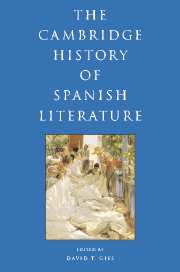Book contents
- Frontmatter
- I INTRODUCTION
- II HISTORY AND CANONICITY
- III THE MEDIEVAL PERIOD
- 2 Medieval Spanish literature in the twenty-first century
- 3 Beginnings
- 4 The poetry of medieval Spain
- 5 Medieval Spanish prose
- 6 The medieval theatre: between scriptura and theatrica
- IV EARLY MODERN SPAIN: RENAISSANCE AND BAROQUE
- V THE ENLIGHTENMENT AND NEOCLASSICISM
- VI THE FORGING OF A NATION: THE NINETEENTH CENTURY
- VII THE MODERN, MODERNISMO, AND THE TURN OF THE CENTURY
- VIII TWENTIETH-CENTURY SPAIN AND THE CIVIL WAR
- IX IN AND OUT OF FRANCO SPAIN
- X POST-FRANCO SPANISH LITERATURE AND FILM
- Bibliography
- Index
- References
4 - The poetry of medieval Spain
from III - THE MEDIEVAL PERIOD
Published online by Cambridge University Press: 28 March 2008
- Frontmatter
- I INTRODUCTION
- II HISTORY AND CANONICITY
- III THE MEDIEVAL PERIOD
- 2 Medieval Spanish literature in the twenty-first century
- 3 Beginnings
- 4 The poetry of medieval Spain
- 5 Medieval Spanish prose
- 6 The medieval theatre: between scriptura and theatrica
- IV EARLY MODERN SPAIN: RENAISSANCE AND BAROQUE
- V THE ENLIGHTENMENT AND NEOCLASSICISM
- VI THE FORGING OF A NATION: THE NINETEENTH CENTURY
- VII THE MODERN, MODERNISMO, AND THE TURN OF THE CENTURY
- VIII TWENTIETH-CENTURY SPAIN AND THE CIVIL WAR
- IX IN AND OUT OF FRANCO SPAIN
- X POST-FRANCO SPANISH LITERATURE AND FILM
- Bibliography
- Index
- References
Summary
In common with other European societies, the earliest vernacular narrative poetry in Spain originated in the form of the heroic epic, a type of poem that has often been defined as dealing with the pursuit of honor through risk. Narrative poetry of this type generally developed later than its lyric equivalent, and this can be attributed to the fact that its content requires the existence of a degree of social, political, and cultural sophistication on the part of the audience for whom it was intended. This sophistication, however, does not imply that vernacular poets and their audiences were yet fully literate, because the earliest epics were likely to have been orally composed and diffused by juglares (“minstrels”), whose works were seldom committed to writing; of those that were, it is thought that many were obtained as a result of dictation, and none has survived in its original form. The essence of this type of poetry lies in its communal spirit and in the telling of great deeds undertaken by larger-than-life heroes whose actions embody the values of the community and celebrate the existence of a bygone, heroic age. Its effect is threefold: it informs and entertains while also inspiring the audience to emulate the heroism of their forebears.
The earliest heroic epics in Spanish dealt with the Counts of Castile and the events that were believed to have transpired under their rule. If other types of epic were composed, no record of them has survived, and so these texts represent the first steps in the establishment of an autonomous Castilian identity. The earliest poem, the Siete infantes de Lara (“Seven Princes of Lara”), has long since been lost, but as it was reworked into chronicles by scribes who plundered it for information, its contents can be partially reconstructed on the basis of assonance (or vowel rhyme) patterns that became fossilized within their prose. Some 550 or so lines have so far been reconstructed, and although not all critics remain convinced of their authenticity, they nonetheless tell an interesting story.
- Type
- Chapter
- Information
- The Cambridge History of Spanish Literature , pp. 75 - 94Publisher: Cambridge University PressPrint publication year: 2005
References
- 1
- Cited by



